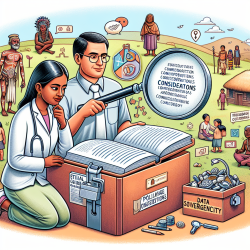Introduction
In the ever-evolving landscape of research, especially when working with Indigenous communities, ethical considerations are paramount. The research article "Conducting research with Indigenous Peoples in Canada: ethical and policy considerations" provides a comprehensive guide for practitioners aiming to enhance their research skills and engage in ethical research practices. This blog aims to distill key insights from the article and encourage further exploration of ethical research methodologies.
Understanding Indigenous Sovereignty in Research
One of the primary themes of the research article is the importance of Indigenous sovereignty in research. Indigenous sovereignty refers to the autonomous control Indigenous communities have over research conducted on their lands or involving their people. This concept is crucial for practitioners to understand and respect, as it ensures that research efforts align with the values and needs of Indigenous communities.
Key Guidelines for Ethical Research
The article outlines several guidelines for conducting ethical research with Indigenous communities:
- Respect for Indigenous Governance: Engage with Indigenous governance structures and seek approval from both customary and formal leaders.
- Meaningful Engagement: Collaborate with Indigenous communities from the outset, ensuring their active participation and input in the research process.
- Utility of Research: Ensure that research benefits the community and addresses their specific needs and priorities.
- Collective Ownership: Recognize the collective ownership of data and research findings by Indigenous communities, ensuring they have access to and control over their data.
Implementing Ethical Practices
Practitioners can implement these guidelines by incorporating them into their research design and methodology. This involves engaging with community leaders, respecting cultural protocols, and ensuring that research outcomes are shared with and beneficial to the community. Additionally, practitioners should be open to adapting their research methods to align with Indigenous knowledge systems and cultural practices.
Encouraging Further Research
The research article serves as a starting point for practitioners interested in ethical research with Indigenous communities. It encourages further exploration of Indigenous research methodologies and the development of practices that prioritize Indigenous voices and perspectives. Practitioners are urged to continue their education on Indigenous rights and research ethics to foster respectful and mutually beneficial research partnerships.
Conclusion
Ethical research with Indigenous communities requires a commitment to respecting their sovereignty, engaging meaningfully, and ensuring that research efforts benefit the community. By implementing the guidelines outlined in the research article, practitioners can enhance their research skills and contribute to positive outcomes for Indigenous communities. For those interested in delving deeper into the topic, the original research paper offers a wealth of information and can be accessed here.










